Ministry of Fear
Last updatedThis article needs additional citations for verification .(March 2019) |
| Ministry of Fear | |
|---|---|
 Theatrical release poster | |
| Directed by | Fritz Lang |
| Written by | Seton I. Miller |
| Based on | The Ministry of Fear by Graham Greene |
| Produced by | Buddy G. DeSylva |
| Starring | Ray Milland Marjorie Reynolds |
| Cinematography | Henry Sharp |
| Edited by | Archie Marshek |
| Music by | Victor Young |
| Color process | Black and white |
Production company | |
| Distributed by | Paramount Pictures |
Release date |
|
Running time | 87 minutes |
| Country | United States |
| Language | English |
Ministry of Fear is a 1944 American spy thriller film noir directed by Fritz Lang, and starring Ray Milland and Marjorie Reynolds. Based on the 1943 novel by Graham Greene, the film tells the story of a man just released from a mental asylum who finds himself caught up in an international spy ring and pursued by Nazi agents after inadvertently receiving something they want. The original music for the film was composed by Victor Young.
Contents
Plot
In wartime England during the Blitz, Stephen Neale is released from Lembridge Asylum. While waiting for a train to London, Neale visits a village fête hosted by the Mothers of Free Nations charity. He is urged to go to the palm reader's tent to have his fortune told by Mrs. Bellane, an older woman. He asks her to ignore the past and tell the future, which startles her. She cryptically tells him to enter a contest and guess the weight of a cake as 4 pounds 15+1⁄2 ounces (2.25 kg). Neale does so and wins the cake. Then a young blond man hurries to see Mrs. Bellane. People try to persuade Neale to give the cake to the blond man, but Neale refuses.
Neale departs Lembridge with only a blind man sharing his train compartment. Neale offers him some cake. Neale sees the blind man crumbling his portion. When the train stops during an air raid, Neale's companion turns out not to be blind after all. He strikes Neale with his walking stick, steals the cake, and flees, with Neale in pursuit. The man shoots at him, but is killed by a German bomb. Neale finds the man's revolver and continues on to London.
Neale hires private detective George Rennit to help him investigate the Mothers of Free Nations. Neale meets Willi Hilfe and his sister Carla, refugees from Austria who run the charity. Willi takes him to Mrs. Bellane's London mansion (followed by Rennit). Neale is shocked to discover that this Mrs. Bellane is a beautiful young medium. She invites them to stay for her séance. Among the other attendees are artist Martha Penteel, psychiatrist Dr. Forrester, and Mr. Cost, the blond man at the fête. After the lights are dimmed, a mysterious voice claims she was poisoned by Neale, disconcerting him. Then a shot rings out – Cost is found shot dead. Neale admits to having the blind man's gun. He flees with Willi's help.
Neale goes to Rennit's office, only to find it ransacked. He talks to Carla. An air raid forces the two to shelter in an Underground station, where Neale reveals that he had planned to euthanize his terminally ill wife. He changed his mind, but she committed suicide using poison he had bought. Due to the circumstances, Neale received a light sentence of two years at the asylum.
The next morning, Carla hides Neale at a friend's bookstore. Neale spots a book by Forrester, The Psychoanalysis of Nazidom. Carla reveals that Forrester is one of her volunteers, as well as a consultant for the Ministry of Home Security. Neale is convinced that Carla's organization is a front for Nazi spies. Carla finds out that almost all the people Neale suspects are charity volunteers, all recommended by Forrester. She tells Willi about her discovery, and admits that she loves Neale.
That afternoon, Neale goes to Penteel’s flat, only to find Mrs. Bellane. The two verbally spar. He flees when Penteel returns and begins screaming for the police.
Later, Carla tells Neale what she has learned. The bookseller asks the couple to deliver some books in a suitcase since they are leaving. They are nearly killed by the bomb inside.
Neale awakens in the hospital, the prisoner of Scotland Yard Inspector Prentice. Neale persuades Prentice to search the bombed-out cottage for evidence. Neale finds a microfilm of military secrets inside a piece of cake in a bird's nest. Officials insist that the documents have only been taken out of a safe twice, the second time when Forrester's tailor, Travers, was present. Neale recalls that the empty flat was leased in Travers' name.
Prentice and Neale go to the tailor's shop, and find that Travers is Cost. Travers ostensibly calls a client about a suit - it is actually a coded message. Then, seeing he is trapped, he commits suicide. When Neale dials the number, Carla answers.
Neale slips away to confront Carla. Willi emerges, armed with a pistol, and admits he is the head of the spy ring. Another copy of the microfilm is sewn into the suit he received from Travers. Carla throws a candlestick, striking her brother's hand. The two men struggle, and Carla picks up the gun. When she refuses to hand it over to Willi, he tries to flee, but she shoots him dead. Forrester and other Nazi agents chase Neale and Carla. Prentice arrives and kills the remaining Nazis.
Cast
|
Comparison with the novel
Graham Greene's protagonist, Arthur Rowe (Stephen Neale in the film), is profoundly tormented with guilt for his having murdered his wife. In the movie, that is a simple mercy killing, an assisted suicide. In the book, Rowe slips the poison into his wife's milk – "how queer it tastes," she says – and leaves her to die alone. Despite the official finding of a mercy killing, he believes "that somewhere there was justice, and justice condemned him." He knows that the deed was not so much to end her suffering, as to end his own. This overwhelming sense of guilt, pervading the novel from beginning to end, is absent from the film.
The film omits all of Rowe's incarceration in Dr Forester's private asylum with amnesia, after the bomb in the booby-trapped case of books explodes. Gradually he works out that the institution is run by Nazi agents and that inmates who find out too much are eliminated. Painful though it is to regain his memories, he realises that he must remember all he can and get out to inform the police.
His love interest, Anna Hilfe (Carla Hilfe in the film), appears in Fritz Lang's movie to be uninvolved in her brother's spy activities. In the novel, she does not shoot her brother dead, and there is no rooftop shootout with Nazi agents. Her brother Willi Hilfe, armed with a gun with a single bullet, commits suicide, in a railway station lavatory, when he cannot escape. Anna (Carla) must forever fear exposure as a spy, just as Rowe (Neale) fears exposure as a murderer. They go on together, lovers, but hardly the happy and carefree couple portrayed in the film: "They had to tread carefully for a lifetime, never speak without thinking twice ... They would never know what it was not to be afraid of being found out." That, not the spy pursuit of the film, is at the heart of Graham Greene's novel.
Response
In a review at the time of release, Bosley Crowther of The New York Times wrote positively of Ministry of Fear, stating: "Mr. Lang has given the picture something of the chilling quality of some of his early German shockers—a strangely arch and maniacal surge that comes through suggestive use of camera and morbid pace in more critical spots. The clammy and numbing sensations of fear are thereby conveyed in a manner that is quite unusual for our generally overworked screen." [2]
Dave Kehr of the Chicago Reader praised the film, writing: "This 1944 thriller represents an epochal meeting of two masters of Catholic guilt and paranoia, novelist Graham Greene and director Fritz Lang. Ray Milland, just released from a sanitorium, finds the outside world more than a fit match for his delusions as he stumbles into an elaborate Nazi plot. The hallucinatory quality of the opening scene (an innocent country fair turns out to be a nest of spies) is reminiscent of Lang's expressionist films of the 20s, but this is a more mature, more controlled film, Lang at his finest and purest." [3]
Judd Blaise, writing for Allmovie, states: "While it does not reach the same level of timeless classic as Carol Reed's adaptation of Greene's The Third Man four years later, Ministry of Fear stands as a well-made, thoroughly gripping and intelligent example of film noir." [4]
Related Research Articles

Friedrich Christian Anton Lang, better known as Fritz Lang, was an Austrian film director, screenwriter, and producer who worked in Germany and later the United States. One of the best-known émigrés from Germany's school of Expressionism, he was dubbed the "Master of Darkness" by the British Film Institute. He has been cited as one of the most influential filmmakers of all time.
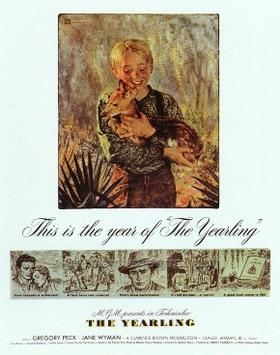
The Yearling is a 1946 American Family Western film directed by Clarence Brown, produced by Sidney Franklin, and released by Metro-Goldwyn-Mayer (MGM). The screenplay by Paul Osborn and John Lee Mahin (uncredited) was adapted from Marjorie Kinnan Rawlings's 1938 novel of the same name. The film stars Gregory Peck, Jane Wyman, Claude Jarman Jr., Chill Wills, and Forrest Tucker.
Their Eyes Were Watching God is a 1937 novel by American writer Zora Neale Hurston. It is considered a classic of the Harlem Renaissance, and Hurston's best known work. The novel explores protagonist Janie Crawford's "ripening from a vibrant, but voiceless, teenage girl into a woman with her finger on the trigger of her own destiny".

Contraband (1940) is a wartime spy film by the British director-writer team of Michael Powell and Emeric Pressburger, which reunited stars Conrad Veidt and Valerie Hobson after their earlier appearance in The Spy in Black the previous year. On this occasion, Veidt plays a hero, something he did not do very often, and there is also an early (uncredited) performance by Leo Genn.

The Testament of Dr. Mabuse, also called The Last Will of Dr. Mabuse, is a 1933 German crime-thriller film directed by Fritz Lang. The movie is a sequel to Lang's silent film Dr. Mabuse the Gambler (1922) and features many cast and crew members from Lang's previous films. Dr. Mabuse is in an insane asylum where he is found frantically writing his crime plans. When Mabuse's criminal plans begin to be implemented, Inspector Lohmann tries to find the solution with clues from gangster Thomas Kent, the institutionalized Hofmeister and Professor Baum who becomes obsessed with Dr. Mabuse.
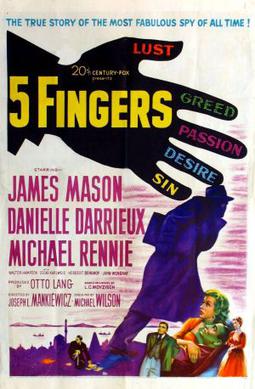
5 Fingers, known also as Five Fingers, is a 1952 American film noir spy film directed by Joseph L. Mankiewicz and produced by Otto Lang. The screenplay written by Michael Wilson was based on the 1950 book Operation Cicero by Ludwig Carl Moyzisch, Nazi commercial attaché at the German embassy in Ankara, Turkey (1943–44).

The Gâteau Affairs (情迷黑森林) is a 20 episode TVB series in late 2004 and early 2005. It stars Joe Ma (馬德鐘), Myolie Wu (胡杏兒), Bobo Chan (陳文媛), Jack Wu (胡諾言) and Annie Man (文頌嫻). Bobo Chan provides the voice for the theme song. Gâteaux is misspelt as "Gâteux" for all scenes and captions within the series.
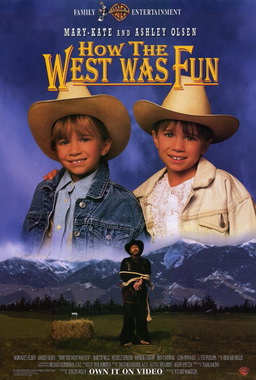
How the West Was Fun is a 1994 Revisionist western film starring Mary-Kate and Ashley Olsen.

They Won't Forget is a 1937 American drama film directed by Mervyn LeRoy and starring Claude Rains, Gloria Dickson, Edward Norris, and Lana Turner, in her feature debut. It was based on a novel by Ward Greene called Death in the Deep South, which was in turn a fictionalized account of a real-life case: the trial and subsequent lynching of Leo Frank after the murder of Mary Phagan in 1913.

Liam Connor is a fictional character from the British ITV soap opera Coronation Street, played by Rob James-Collier from 2006 to 2008.

Carla Connor is a fictional character from the British ITV soap opera Coronation Street, played by Alison King. She made her first appearance on screen during the episode airing on 1 December 2006 and introduced as the wife of Paul Connor. This was King's second role in the soap as she previously played Mrs. Fanshaw for one episode in 2004. King appeared in her 1,000th episode as Carla on 22 May 2015. Carla has been referred to as "the new Elsie Tanner".

Spione is a 1928 German silent espionage thriller directed by Fritz Lang and co-written with his wife, Thea von Harbou, who also wrote a novel of the same name, published a year later. The film was Lang's penultimate silent film and the first for his own production company; Fritz Lang-Film GmbH. As in Lang's Mabuse films, Dr. Mabuse: The Gambler (1922) and The Testament of Dr. Mabuse (1933), Rudolf Klein-Rogge plays a master criminal aiming for world domination.
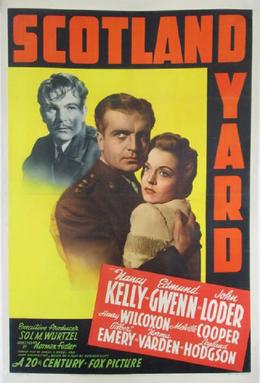
Scotland Yard is a 1941 American crime drama film starring Nancy Kelly and Edmund Gwenn about a fugitive whose visage has been altered with plastic surgery. The film was directed by Norman Foster. It is also known as Uncensored. It is a remake of the 1930 film of the same title, which was in turn based on a 1929 play Scotland Yard by Denison Clift.

Man Hunt is a 1941 American thriller film directed by Fritz Lang and starring Walter Pidgeon and Joan Bennett. It is based on the 1939 novel Rogue Male by Geoffrey Household and is set in Europe just prior to the Second World War. Lang had fled Germany into exile in 1933 and this was the first of his four anti-Nazi films, which include Ministry of Fear, Hangmen Also Die!, and Cloak and Dagger. It was Roddy McDowall's first Hollywood film after escaping London following the Blitz. Man Hunt was one of many films released in 1941 that were considered so pro-British that they influenced neutral members of the U.S. public to sympathize with the British side in World War II.

The Ministry of Fear is a 1943 novel written by Graham Greene. It was first published in Britain by William Heinemann. It was made into the 1944 film Ministry of Fear, directed by Fritz Lang and starring Ray Milland.
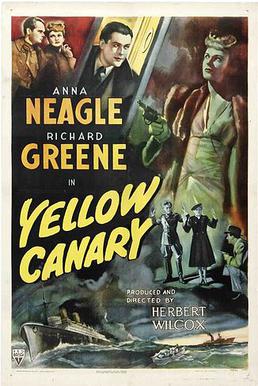
Yellow Canary is a 1943 British drama film directed by Herbert Wilcox and starring Anna Neagle, Richard Greene and Albert Lieven. Neagle plays a British Nazi sympathizer who travels to Halifax, Canada, trailed by spies from both sides during the Second World War. Neagle and director/producer Wilcox collaborated on a number of previous film projects.
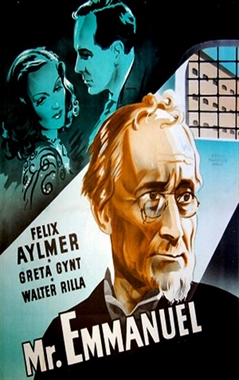
Mr Emmanuel is a 1944 British drama film directed by Harold French and starring Felix Aylmer, Greta Gynt and Walter Rilla.
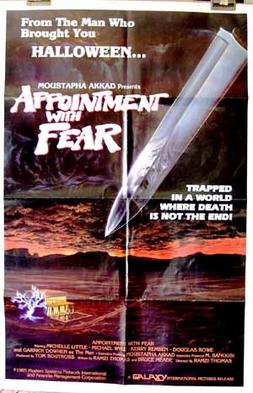
Appointment with Fear, also known as Deadly Presence, is a 1985 American horror film directed by Ramsey Thomas for Moustapha Akkad and Moviestore Entertainment. The film stars Michele Little, Douglas Rowe, Garrick Dowhen, and Kerry Remsen.

Secret Enemies is a 1942 American drama film directed by Benjamin Stoloff and written by Raymond L. Schrock. The film stars Craig Stevens, Faye Emerson, John Ridgely, Charles Lang, Robert Warwick, and Frank Reicher. The film was released by Warner Bros. on September 17, 1942.
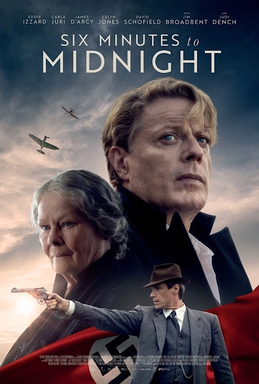
Six Minutes to Midnight is a 2020 British war drama film directed by Andy Goddard from a screenplay loosely based on a true story by Goddard, Celyn Jones and Eddie Izzard, starring Izzard, Judi Dench, Carla Juri, James D'Arcy and Jim Broadbent.
References
- ↑ "Thrill Bill Announced". Los Angeles Times . December 28, 1944. p. 8 – via Newspapers.com.
- ↑ Crowther, Bosley (February 8, 1945). "The Screen; in New Film". The New York Times. ISSN 0362-4331 . Retrieved September 7, 2020.
- ↑ Kehr, Dave (October 26, 1985). "Ministry of Fear". Chicago Reader. Retrieved October 27, 2020.
- ↑ "Ministry of Fear". Movies.com. Retrieved September 7, 2020.
External links
- Ministry of Fear at IMDb
- Ministry of Fear at the TCM Movie Database
- Ministry of Fear at Letterboxd
- Ministry of Fear at AllMovie
- Ministry of Fear at the American Film Institute Catalog
- Ministry of Fear at Rotten Tomatoes
- Time Out London
- Variety 1945
- Ministry of Fear on the NBC University Theater: January 23, 1949
- Ministry of Fear: Paranoid Style an essay by Glenn Kenny at the Criterion Collection
Text is available under the CC BY-SA 4.0 license; additional terms may apply.
Images, videos and audio are available under their respective licenses.